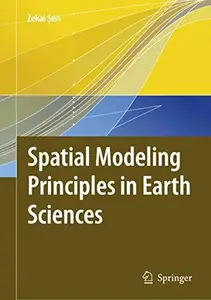September 17, 2024
Spatial Modeling Principles in Earth Sciences

Free Download Spatial Modeling Principles in Earth Sciences By Zekai Sen (auth.)
2009 | 351 Pages | ISBN: 1402096712 | PDF | 8 MB
A comprehensive presentation of spatial modeling techniques used in the earth sciences, this book also outlines original techniques developed by the author. Data collection in the earth sciences is difficult and expensive. It requires special care to gather accurate geological information. Spatial simulation methodologies in the earth sciences are essential, then, if we want to understand the variability in features such as fracture frequencies, rock quality, and grain size distribution in rock and porous media. This book outlines in a detailed yet accessible way the main spatial modeling techniques, in particular the Kriging methodology. It also presents many unique physical approaches, field cases, and sample interpretations.Since Kriging’s origin in the 1960s it has been developed into a number of new methods such as cumulative SV (CSV), point CSV (PCSV), and spatial dependence function, which have been applied in different aspects of the earth sciences. Each one of these techniques is explained in this book, as well as how they are used to model earth science phenomena such as earthquakes, meteorology, and hydrology. In addition to Kriging and its variants, several alternatives to Kriging methodology are presented and the necessary steps in their applications are clearly explained. Simple spatial variation prediction methodologies are also revised with up-to-date literature, and the ways in which they relate to more advanced spatial modeling methodologies are explained.The book is a valuable resource for students, researchers and professionals of a broad range of disciplines including geology, geography, hydrology, meteorology, environment, image processing, spatial modeling and related topics.Prof. Dr. Zekai Sen is a researcher at the Istanbul Technical University, Turkey. His main interests are renewable energy (especially solar energy), hydrology, water resources, hydrogeology, hydrometeorology, hydraulics, philosophy of science, and science history. He has been appointed by the United Nations as a member of the Intergovernmental Panel on Climate Change (IPCC) for research on the effects of climate change. He published more than 200 papers in about 50 scientific journals, and 3 books: Applied Hydrogeology for Scientists and Engineers (1995, CRC Lewis ✅Publishers), Wadi Hydrology (2008, CRC Lewis ✅Publishers), and Solar Energy Fundamentals and Modeling Techniques: Atmosphere, Environment, Climate Change and Renewable Energy (2008, Springer).
Buy Premium From My Links To Get Resumable Support,Max Speed & Support Me
Links are Interchangeable – Single Extraction

